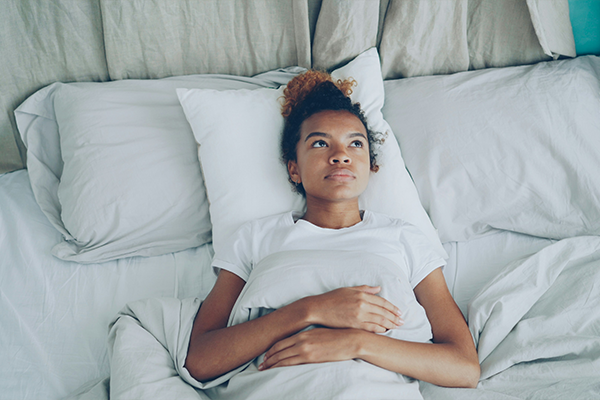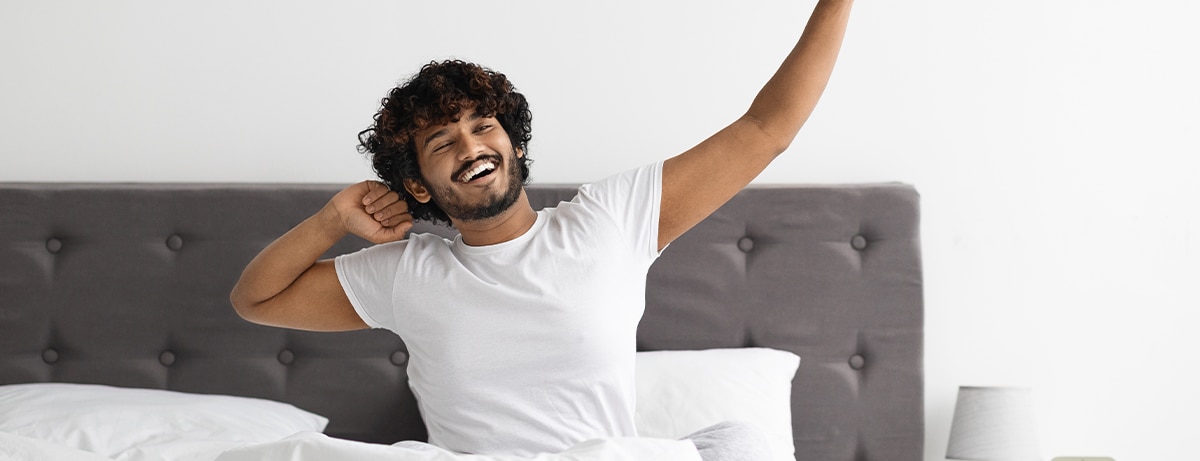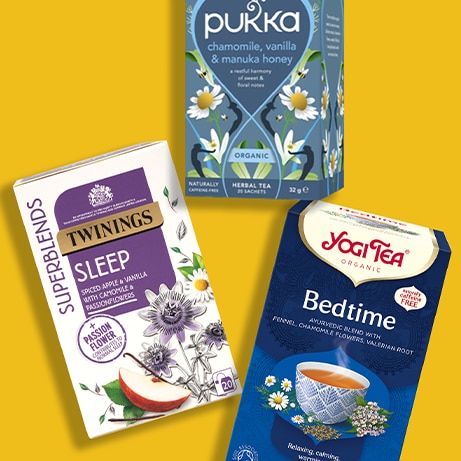15% off £25 or 20% off £35
Code:BASKET
How to fall asleep quicker? A sleep scientist weighs in

When you’re desperate for slumber but can’t seem to drift off, sleep scientist and podcaster Dr Sophie Bostock has four tried-and-tested tips
Summary
1Why sleep matters
Sleep isn’t a luxury – it’s a necessity. It’s when your body repairs, restores and recharges…
2How long should it take to fall asleep?
Research suggests it can take around 5–18 minutes to fall asleep, with an average of about 11.7 minutes in healthy adults. This transition phase…
3Quick ways to fall asleep fast
If you’re looking for a fast track to dreamland, these evidence-based sleep hacks may help you…
When you’re desperate for slumber but can’t seem to drift off, sleep scientist and podcaster Dr Sophie Bostock has four tried-and-tested tips. You’ve tried everything, but sleep isn’t coming easily – and it turns out that the ‘trying’ part could be where we’ve been getting it wrong.
According to Dr Bostock, the more effort you put in, the more elusive sleep can get. Her secret for ending the insomnia cycle? Ease off the pressure and learn simple techniques to switch off and relax yourself into a deep slumber.
But before peeling back the covers on her expert tips, let’s look at why sleep matters, how long it should take to nod off, and the common reasons so many of us are struggling to snooze.
Why sleep matters
Sleep isn’t a luxury – it’s a necessity. It’s when your body repairs, restores and recharges. Research shows that quality sleep supports your:
- immune system, helping protect against everyday illnesses like colds and flu
- mood regulation and mental wellbeing concentration, memory and reaction times
- long-term health, with studies linking poor sleep to higher risks of obesity, heart disease, and type 2 diabetes
How long should it take to fall asleep?
Research suggests it normally takes between 5 and 18 minutes to fall asleep, with an average of about 11 minutes in healthy adults. This phase is called sleep latency and it’s a good indicator of overall sleep health. Falling asleep the instant your head hits the pillow might sound ideal, but it’s often a sign of sleep deprivation.
On the other hand, if you regularly lie awake for 30 minutes or more, it could mean that stress, lifestyle habits or even an underlying sleep disorder are disrupting your sleep cycle.
Common reasons you can’t fall asleep
If sleep is playing hard to get, one or more of these common culprits could be responsible:
- stress and anxiety, which keep your mind racing at bedtime
- too much screen time, with blue light suppressing melatonin (the hormone that signals it’s time for bed)
- caffeine, stimulants and alcohol, which can all disrupt the sleep cycle
- an irregular sleep schedule, making it harder for your body clock to keep time
- no wind-down routine, leaving your brain stuck in ‘go mode’
- poor sleep environment, such as a room that’s too hot, bright or noisy
- overstimulation before bed, like late-night workouts or gaming
- lack of physical activity during the day, so your body doesn’t feel ready for rest
- processed foods before bed that can spike energy levels and disturb your sleep
- certain medications or health conditions, such as insomnia or sleep apnoea
Dr Bostock’s four expert techniques for falling asleep faster
1. Take the pressure off
Next time you’re trying desperately to sleep, stop forcing it and instead focus on staying awake. This is called paradoxical thinking and involves lying in bed with your eyes open, gazing softly at a spot on the wall. Remind yourself that you’re safe, warm and happy just to rest. If your body needs sleep, it will come.
“When your eyelids start to feel heavy, keep them gently open. You might stay awake for a little while in this relaxed state. But more likely, by removing the pressure, sleep will naturally take over,” says Dr Bostock.
2. Gentle distraction
“If you’ve tried the first tip and done some slow, deep breathing, and you still feel wide awake after about 20 minutes, get out of bed. The goal is to avoid associating your bed with frustration and anxiety about not sleeping. Try a gentle distraction in another room, like reading, watching a feel-good film or doing sudoku without trying to sleep.
If you find yourself getting sleepy, go back to bed. Over time, your brain will learn that bed is for sleep (and other pleasurable activities), not frustration. You might need to repeat this a few times initially, but it’s effective for retraining your brain,” says Dr Bostock.

3. Give the thought-blocking technique a go
“This one is good if you wake up in the middle of the night. Make yourself comfortable and repeat the word ‘the’ to yourself every two seconds. Yes, it’s really boring – but it’s just distracting enough to block out busy thoughts and can help you drift off again.”
4. Try ‘one-two’ relaxation breathing
“Anxiety and insomnia are often interlinked, and some people can get trapped in a perpetual state of stress before bed. Even if your mind isn’t going wild, your body might struggle to let go of the day’s stressors.
Try the ‘one-two’ breathing technique – breathe in for one and out for two. When it starts to feel easy, just add one each time. When you breathe out for longer than you breathe in, your heart rate slows, tense muscles relax and – by challenging the brain a little – you can distract yourself from busy thoughts into deep sleep,” says Dr Bostock.
Quick sleep hacks to try
Alongside Dr Bostock’s expert methods, research suggests these simple strategies can help you drift off faster:
- progressive muscle relaxation – slowly tensing and releasing different muscle groups from your toes up to your head
- the 4-7-8 breathing method – inhale for 4, hold for 7, exhale for 8, repeat until calm
- soothing sounds – white noise, rainfall or guided sleep meditations to drown out distractions
- herbal teas – chamomile, valerian root or passionflower may be calming caffeine-free options
- journaling – jotting down worries or tomorrow’s to-do list can clear your head before bed
Sleep hygiene tips for long-term success
Falling asleep quickly isn’t just about what you do at night – it’s also about setting the stage throughout the day. Sleep experts call these habits sleep hygiene:
- stick to a consistent bedtime and wake-up time
- avoid caffeine in the afternoon or evening
- cut down on alcohol and heavy meals close to bedtime
- make your bedroom cool, dark and quiet
- keep screens out of the bedroom, or use blue light filters
- get daily exposure to natural light to support your circadian rhythm
- stay active with regular exercise, ideally earlier in the day
The final say
Next time you’re sick of counting sheep, give these techniques a try. Sleep isn’t just about night-time either – improving your daily habits, from managing stress and movement to a calming evening routine, can set you up for snoozy success.
Still struggling? Speak to your GP, as persistent insomnia or other sleep disorders like restless legs syndrome may need medical support.
Looking for natural ways to boost your bedtime routine? Explore our guide to natural sleep remedies.
Disclaimer - This article provides informational advice and is not a substitute for medical care. Curated by experts for accuracy, we take great care to ensure the information is up-to-date and relevant. However, you should always consult your GP or healthcare professional before using supplements or alternative products, particularly if you have medical conditions or are under supervision.
1. Suni E. Anxiety and Sleep [Internet]. Dimitriu A, editor. Sleep Foundation. 2024. Available from: https://www.sleepfoundation.org/mental-health/anxiety-and-sleep
2. Norelli SK, Long A, Krepps JM. Relaxation Techniques [Internet]. PubMed. Treasure Island (FL): StatPearls Publishing; 2023. Available from: https://www.ncbi.nlm.nih.gov/books/NBK513238/
3. NHS. Sleep problems [Internet]. [cited 2025 Feb 18]. Available from: https://www.nhs.uk/every-mind-matters/mental-health-issues/sleep/
4. NHS. How to fall asleep faster and sleep better [Internet]. [cited 2025 Feb 18]. Available from: https://www.nhs.uk/every-mind-matters/mental-wellbeing-tips/how-to-fall-asleep-faster-and-sleep-better/
5. Brinkman JE, et al. Physiology of sleep. Treasure Island (FL): StatPearls Publishing; 2023. Available from: https://www.ncbi.nlm.nih.gov/books/NBK482512/
6. National Institute of Neurological Disorders and Stroke. Brain basics: Understanding sleep [Internet]. [cited 2025 Feb 18]. Available from: https://www.ninds.nih.gov/health-information/public-education/brain-basics/brain-basics-understanding-sleep
7. National Heart, Lung, and Blood Institute. How sleep works: Why is sleep important? [Internet]. [cited 2025 Feb 18]. Available from: https://www.nhlbi.nih.gov/health/sleep/why-sleep-important/
8. National Heart, Lung, and Blood Institute. Sleep deprivation and deficiency: How sleep affects your health [Internet]. [cited 2025 Feb 18]. Available from: https://www.nhlbi.nih.gov/health/sleep-deprivation/health-effects/
9. Iskander A, et al. Normal multiple sleep latency test values in adults: A systematic review and meta-analysis. Sleep Med. 2023;109:143–8. https://doi.org/10.1016/j.sleep.2023.06.019
10. National Library of Medicine. Sleep disorders [Internet]. [cited 2025 Feb 18]. Available from: https://medlineplus.gov/sleepdisorders.html














